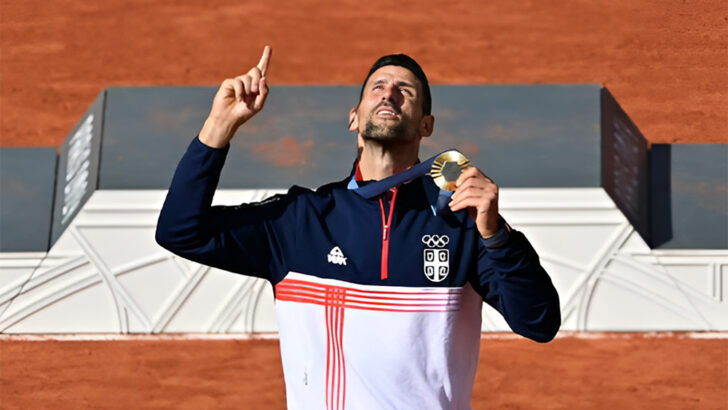Last week I finished the good, the bad and the ugly of the opening ceremony of the Olympics. Since then, I’ve enjoyed the genuine sportsmanship and especially the impressive achievements of the Irish competitors.
Watching Paris Olympics 2024, on RTÉ 2 for the most part, I’ve found it noteworthy to see so many participants blessing themselves before and after events or appearing to thank God or ‘the heavens’ or some ‘higher power’ for their success across so many disciplines. I found it prominent in those from Latin countries, though, to a lesser extent I’ve seen Irish competitors show this gratitude also. Among the most prominent examples, the great Novak Djokovic blessed himself in an untypical exuberance of emotion after winning that elusive gold medal in that gripping men’s tennis final.
I enjoyed the camaraderie between opponents even after very competitive events, including boxing. I’m not a great fan of competitors being interviewed by the media after a defeat, but many have been graceful – e.g. Jodie McCann after losing out in 5,000 m. Of course, winners celebrate – rowing champions Paul O’Donovan and Fintan McCarthy are an interviewer’s delight with their witty banter and casual homespun wisdom. I loved their interview with Darragh Maloney hours after their victory. I loved the modesty and grace towards fellow competitors shown by gymnast Rhys McClenaghan after his gold medal victory on the pummel horse – such great role modelling. The boxing produced fine wins for Kellie Harrington, but also controversy, whether because of questionable decisions or those fights where boxers previously deemed ineligible by the International Boxing Association on chromosomal/sex/gender grounds were allowed by the International Olympics Committee to fight in the women’s competition.
Back in more overtly religious territory I was also impressed by the interview with Deacon Frank Browne of Ballyroan parish in Dublin on Liveline (RTÉ 1, Thursday). Many people do not understand the role of the deacon in Church life, but I’d suspect we’ll be seeing lots more of them as they perform tasks previously carried out by priests. Mr Browne gave clarity on what they can do (e.g. baptisms, funerals, weddings) and what they can’t do (e.g. Eucharist, Confession). The item arose in the context of that programme stretching coverage of the Bishop Casey controversy into a second week. Mr Browne made a useful point about perception – approx. 7% of priests were abusers, with most of it in the past, yet he finds that when asked, people’s estimates are never less than 30%. He reminded us that ‘‘a small number abused an awful lot of children”, and that the governance around the issue was a “disaster”. Further, he thought priests needed some sort of safeguarding to deal with the ‘lingering cloud of suspicion’. It was an engaging, informative and non-confrontational interview.
However, it was confrontation all the way in England last week and last weekend in the aftermath of that awful stabbing incident in Liverpool. When we have a child allegedly murdering other children society has a major problem. Violent knee jerk reactions dominated media for a week, doing dishonour to victims, grieving families and communities. As many commentators pointed out it was worryingly reminiscent of the aftermath of the Dublin stabbing and subsequent rioting. It seems false assumptions were made on social media (a common complaint) about the ethnicity, status, and/or religion of the suspect leading to attacks on mosques and hotels where asylum seekers were living and consequently on the police. A guest on Henry Bonsu (Times Radio, Friday), trying to instil some sense and reason into the controversy, pointed out that native English are perfectly capable of committing horrible murders – e.g. Fred West, Myra Hindley, including cases of children murdering children.
By the weekend the violence had come closer to home with rioting in Belfast, as if they hadn’t had enough of that over the years. It was a ‘Day of Shame’, according to Justice Minister Naomi Long (MLA, Alliance Party) on Morning Ireland (RTÉ Radio 1) last Monday.
Finally, a quick word of praise for The Turkish Detective (BBC One, Mon) which came to a very satisfying end last week. It was a crime drama set in Istanbul with a detective transferred over from London following a case involving his old girlfriend. Like many good drama series, I felt the creative team liked and understood people – we had three-dimensional characters we could root for despite their flaws. I hope we’ll see a second series.
PICK OF THE WEEK
SUNDAY
BBC Radio 4 Sunday August 11, 7am
Covering a wide variety of topical religious and ethical issues.
MOVIE: BEN-HUR
Channel 4 Sunday August 11, 11.20pm
(2016) Jack Huston plays Judah Ben-Hur, a Jewish nobleman who’s reduced to being a galley slave. He becomes a convert to nascent Christianity, Jesus (Rodrigo Santoro) himself having offered Judah solace on his way to the galleys.
THE KNIGHT
EWTN Wednesday August 14, 9.30pm
The story of Maximilian Kolbe, a Polish Catholic priest who sacrificed his life to save a fellow prisoner at Auschwitz. His selflessness was a triumph of compassion over adversity.


 Brendan O’Regan
Brendan O’Regan Novak Djokovic
Novak Djokovic 